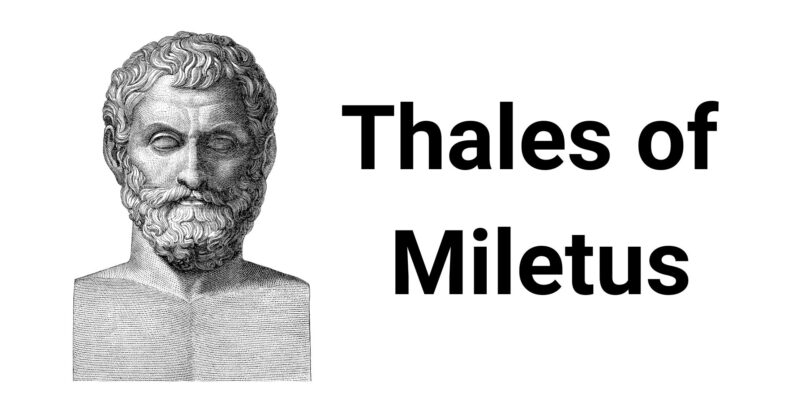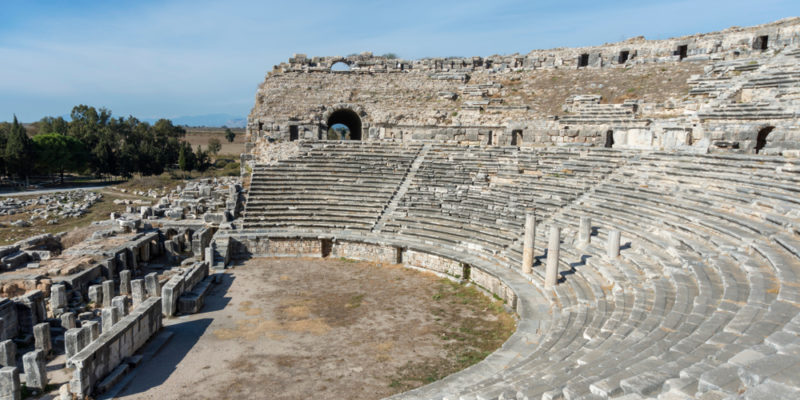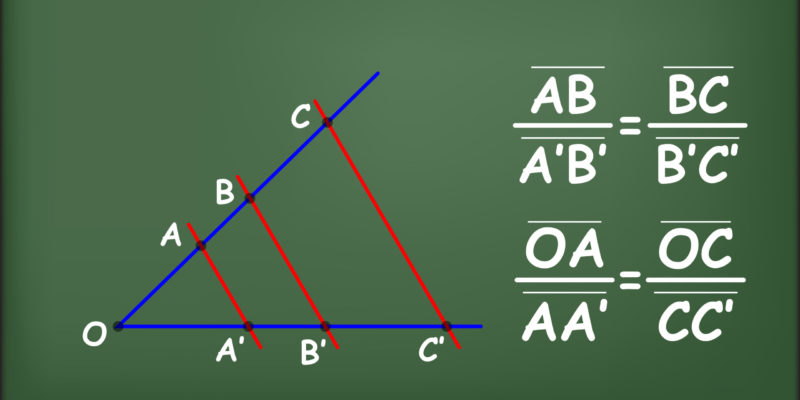We explain who Thales of Miletus was, his contributions and ideas. In addition, Thales’ theorems and the main characteristics of the Milesian school.

Who was Thales of Miletus?
Thales of Miletus was an Ancient Greek philosopher and mathematician who lived between 624 BC and 548 BC in Miletus, in modern-day Turkey. His philosophy was a complete break from the prior mythological explanation of the world and it gave way to rational and logical thinking. This transformation is known as the transition from mythos to logos and is considered the beginning of Western philosophy.
Thales is one of the first physical or pre-Socratic philosophers. With him began a period which broke from the prior religious or mythological explanations regarding natural phenomena and the origin of the world. He is often referred to as the first philosopher, though this is true only for the Western world, heir to Greco-Latin thought. Thales was recognized as one of the Seven Sages of Greece.
One of the main subjects of his study was the arche or principle of all things. In Ancient Greek, the arche (ἀρχή) is the "beginning" or "origin" of all that is, both in a temporal and ontological sense. For Thales of Miletus, the originating principle of the world was water and he thus held that everything that existed was formed from it. His ideas and discoveries are considered to span disciplines such as mathematics, engineering and astronomy.
In fact, he is credited with having predicted the solar eclipse in 585 BC. However, several classical, modern and contemporary schools dedicated to the history of philosophy maintain that this is not true and that, in any case, without a direct source of the account, the hypothesis lacks foundation.
- See also: René Descartes
Main ideas of Thales of Miletus
Thales' ideas can be summarized as follows:
- For Thales, the physical universe could be explained through reason, despite its apparent disorder. He rejected any thought based on mysticism or magic.
- He investigated the primary principle of the universe and its nature. He was the first to question the nature of things and considered that, just as a piece of a mineral could be transformed into copper, all substances could be transformed into other substances.
- He believed that the first principle of all things must be material and eternal. He wondered whether at their origin all substances could have the same appearance and whether all things were in fact different aspects of the same originating substance.
- He thought the Earth as a flat disk floating on an infinite ocean covered by a celestial sphere, which was the sky.
- He was the first to introduce geometry in Greece and is credited with mathematical theorems and discoveries. Many of them are compiled in Greek mathematician Euclid’s work “Elements”.
- According to Greek historian Diogenes Laërtius, Thales was able to predict an eclipse and estimated the size of the moon in relation to the Sun.
- He was one of the first thinkers to have allegedly applied deductive reasoning.
- He believed in a universal principle (accessible through reason) which controlled and accounted for all things.
- He made no distinction between philosophy and science.
Life and work of Thales of Miletus

There are no precise details on the life of Thales of Miletus. Most of the information has come down to us from doxographers and compilers who lived at a much later time. Nonetheless, there is some widely accepted authoritative information, as is the case with Aristotle's Metaphysics, where reference is made to Thales and his work, particularly as a physicist or naturalist philosopher.
Thales was born in a region called Miletus in Ancient Greece, nowadays western Turkey. As was customary at the time, thinkers were known by their name followed by their place of birth, hence Thales is known as Thales of Miletus.
Though his theories revolutionized thought and his ideas have survived to the present day, no original writings of this thinker have been preserved, nor is he known to have written any. Therefore, there are no reliable sources that account for the authorship of many of the discoveries attributed to Thales, and most of the information that has come down to us is approximate. He is believed to have been born in Miletus in 624 BC. During his youth he allegedly visited Egypt, where he would have learned geometry and other sciences, studying with Egyptian priests.
Thales is credited with various theorems and reasonings, among which his eponymous theorems in the field of geometry stand out, even if authorship is not ascertained.
The Milesian or Ionian School

The Milesian or Ionian school was founded by Thales of Miletus, along with two contemporary philosophers and inhabitants of Miletus: Anaximander and Anaximenes. This school is considered to be the oldest in Greece and was characterized by the study of nature and the originating principle of the world, which is the reason for their appellation of "physicists". The Milesian philosophers were the first to suggest that through reason answers could be found as to certain uniformity of the universe, as well as to the alternation of day and night or summer and winter, for example.
According to Anaximander (610 BC -- 545 BC), a disciple of Thales, the originating principle of the world, or arche, was apeiron, which he defined as that which is indefinite and unlimited. Anaximenes in turn (590 BC -- 524 BC) held that the originating element of the universe was air.
From the accounts of Aristotle and Diogenes Laërtius we can certainly assert that Thales was the founder of the Ionian school of philosophy and that he believed water to be the originating substance or “the first principle of things”. This conception of water as the single material substance or arche is the reason Thales is regarded as the first philosopher in the Greek tradition or the first Western sage.
The eclipse
Another certainty that comes to us from Herodotus (a historian who lived 150 years after him) is that Thales predicted to the Ionians that there would be an eclipse during the battle between the Lydians and the Medes, on May 28, 585 BC. This prediction is considered one of the most significant events of Antiquity.
Later studies, however, have proven that Thales could not have predicted the date of the eclipse accurately nor based on a mathematical method, since his conception of the world was that of a flat planet floating on an infinite source of water. This could not have allowed him to perform the necessary calculations to measure the distance between the Earth and the Moon and between the Moon and the Sun. In fact, it is Herodotus himself who seems to point out that Thales did nothing more than indicate the year of the eclipse using a calculation period known as Saros (a cycle of 223 lunar months).
Regardless of the inaccuracies, the scarcity of reliable information and the discrepancies in the accounts regarding the Ionian philosopher, the magnitude of the profound changes he introduced in Greek and Western philosophical thought is undeniable. The mere fact that Aristotle, the highest historiographical authority of Antiquity, mentions him in the Metaphysics as the first philosopher is reason enough for him to occupy a privileged position in the history of Western philosophy.
Water as the arche or first principle
Aristotle writes in his Metaphysics that, based on his study of the nature of things, Thales concluded that all substances come out of a single ultimate substance. Following this assertion, he designated that the arche (or archai, the origin, source or principle of things that exist) was water, since it was not possible for any living being (animal or vegetable) to exist without it. As regards the concept of the first principle, Aristotle says:
(...) Thales, the founder of this philosophy, says that the originating principle is water and, for this reason, affirmed that the earth rests on it. Presumably he derived this assumption from seeing that the nutriment of everything is moist, and that heat itself is generated from moisture and depends upon it for its existence (and that from which a thing is generated is always its first principle).
(Metaph. A, 983a b6 and following)
This thought and his quest to explain natural phenomena through reason made Thales the "father of philosophy". While the philosophers of his time did not accept the idea that the origin of things was water, they did accept and agree that all things that exist come from a single origin. For Anaximander, the origin of everything was the apeiron; for Anaximenes, it was air; as for Heraclitus, it was fire and in the case of Parmenides, it was being.
Mathematical contributions and theorems of Thales

Thales is believed to have introduced geometry in Greece after traveling and studying in Egypt. Today, there are two theorems applied in the field of geometry which are ascribed to him. Thales is thought to have calculated the height of the pyramids of Giza in Egypt from their shadows.
The following two theorems are currently considered to have been discovered by Thales or, in any case, are named in his honor:
- Thales' first theorem. It states that if a line is drawn parallel to one side of a triangle to intersect the other two sides in distinct points, then the other two sides are divided in the same ratio.
- Thales' second theorem. It is applied in geometry and refers to right triangles, circles and inscribed angles. It states that the diameter of a circle always subtends a right angle to any point on the circle.
Thales is also credited with the following mathematical contributions:
- A circle is bisected by its diameter.
- The base angles of an isosceles triangle are equal.
- Opposite angles formed by intersecting straight lines are equal.
- The angle inscribed inside a semicircle is a right angle.
These findings were ascribed to Thales by Diogenes and Proclus. In any case, it should be pointed out that attributing significant discoveries to great thinkers was a common practice in antiquity.
References
- Guthrie, W. (1984). Historia de la filosofía griega, vol. I. Los primeros presocráticos y los pitagóricos. Gredos.
- Guthrie, W. (1953). Los filósofos griegos. De Tales a Aristóteles. FCE.
- Bernabé, A. (2008). Fragmentos presocráticos, de Tales a Demócrito. Alianza.
- “Thales of Miletus”. Britannica.
- “Thales of Miletus”. World History Encyclopedia.
- “Tales de Mileto”. Biblioteca Virtual Miguel de Cervantes.
Related articles:
Was this information useful to you?
Yes NoThank you for visiting us :)